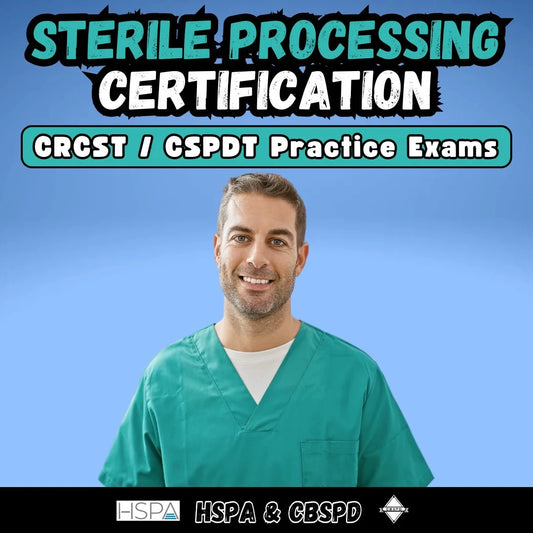What is a Sterile Processing Technician?

When you think of hospitals, you probably imagine doctors, nurses, and patients. But there are important healthcare workers you might not see — like Sterile Processing Technicians (SPTs). Even though they don’t work directly with patients, their job is critical for keeping surgeries and medical procedures safe and successful.
What Does a Sterile Processing Technician Do?
A Sterile Processing Technician (also called a Central Service Technician, Medical Device Technician or Instrument Technician) makes sure surgical instruments and medical equipment are clean, sterilized, and ready for use. They do everything from cleaning used surgical tools to organizing them so doctors and nurses can grab what they need right away.

Main Responsibilities of a Sterile Processing Technician
SPTs have a lot of important tasks to do every day. Here’s what their job usually involves:
- Decontamination: After surgeries, SPTs clean and disinfect tools to remove blood, tissue, and other gunk. They use special cleaning solutions, ultrasonic washers, and large instrument washers to get the job done.
- Inspection and Assembly: Once the surgical tools are clean, SPTs carefully check them for damage or wear. They have to be super careful to make sure everything works perfectly. Then, they put the instruments together into sets or trays that will be used in future surgeries.
- Sterilization: The surgical tools are then sterilized using either machines called autoclaves that use steam and pressure to kill any remaining germs. Sometimes, other methods like gas or chemicals are used, depending on the instrument.
- Storage and Distribution: After sterilization, the surgical tools are packaged and stored in a way that keeps them sterile. SPTs organize everything and make sure the right tools get to the right places when needed.

Why Sterile Processing Technicians Are So Important
Keeping surgical tools clean and ready to go isn’t just about being neat and clean — it’s about keeping patients safe from infections. Infections and transmissions of disease from dirty instruments can cause more surgeries, longer hospital stays, or even serious health problems. By making sure everything is sterile and ready to use, SPTs help save lives every single day.
Skills and Training Needed to Become an SPT
To become a Sterile Processing Technician, you usually need a high school diploma or GED. After that, you’ll need specialized training from community colleges or vocational schools. These programs teach you the skills you need and give you hands-on experience. I personally recommend using Preppy which is an Online Sterile Processing Technician Training Program that is flexible, affordable, and accredited.
Important Skills for SPTs:
- Attention to Detail: Making sure every surgical tool is clean and functions properly.
- Manual Dexterity: Handling tiny, delicate instruments with steady hands.
- Knowledge of Sterilization: Understanding the different ways to make instruments safe.
- Communication Skills: Working well with surgical teams and other healthcare staff.
- Physical Stamina: Being able to stand for long periods and lift heavy trays of surgical tools.
Most employers prefer SPTs who are certified. The most recognized certification is the CRCST (Certified Registered Central Service Technician) offered by HSPA (Healthcare Sterile Processing Association). This certification shows employers you have the right knowledge and skills to do the job well.

Job Outlook for Sterile Processing Technicians
The demand for Sterile Processing Technicians is growing. The U.S. Bureau of Labor Statistics says jobs for medical equipment preparers (which includes SPTs) are expected to grow by 6% from 2021 to 2031. That’s about as fast as most other fast growing jobs.
Why? Because more people are having surgeries, and there’s a big need to prevent infections in hospitals and clinics. This makes SPT work stable and important for the healthcare system.
Final Thoughts
Even though Sterile Processing Technicians aren’t in the spotlight, their work is crucial. They make sure surgical tools are clean, safe, and ready to go. This keeps patients safe and helps doctors and nurses do their jobs better.
If you want a healthcare career that’s rewarding, important, and always in demand, becoming a Sterile Processing Technician might be the perfect choice for you!
Share
Let customers speak for us
from 254 reviewsUsed the practice questions and passed my sterile processing certification easy!
I literally took my test twice and wasn’t able to pass I almost gave up but I said let me try out this guy that all
The techs been telling me course , and I passed finally !! I would definitely recommend this course.
I really enjoy studying on the Sterile Guy page, all the information that is available on here is Fantastic! Waiting to get my test date and when I do I’ll be back to let you know how well this site is!! Thanks
Thank you sterile guy!I saw some of your questions on the exam.Definitely a huge help
Easy to understand and helpful to prepare CRCST Test.
Wish I had found this sooner !!! You know your stuff!!! I commend you for your hard work and dedication! This is the best study tools I’ve ever had. Thank you sterile guy! Much love from your fellow CER and CRCST and CIS tech
I took the practice test and I got a 91% on my certification exam!!
This course was the extra boost that I needed in order be confident in passing the exam. Thank you for all the information provided. I even refer to your notes while working.
Very helpful to me I can study any where at my own pace and low cost than going to school...I'm glad that there is something like this online to help anyone who want to pursue their career as a sterile processing tech.
I loved it, it’s very informative and the questions are great, it’s a great resource to purchase if you want to prepare for your certification exam!
I’ve really enjoyed this course so far. It delivers the information in a straightforward, digestible way. The Sterile Guy has compiled a highly effective program. Thanks very much from one highly satisfied customer!
The practice exams are detailed and easy to navigate. Brandon continues to show his passion in this industry by sharing his knowledge with up-and-coming techs. I also recommend investing in his flashcards. It has helped me greatly. Thank you, Brandon!,
These practice quizzes really helped me get the hang of answering questions related to instruments and the processes of preparing them! I even bought them twice cause I ran out of time lol. Super helpful!








